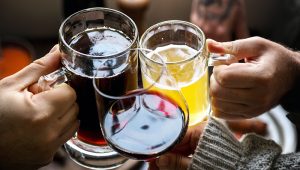Originally published in The Wall Street Journal by Brianna Abbott and Josh Ulick "You can probably assume that the tequila shot staring at you from the sticky bartop isn’t good for you. But what about that glass of red wine at dinner? Some Americans have long been sold on the so-called health benefits of red wine, partly because of animal studies that touted the promise of an antioxidant called resveratrol to fight against a range of diseases. But scientists have debunked that concept in … [Read more...]
News & Events
William C. Kerr Discusses Alcohol Use and Injuries in Time Magazine
“The tide has largely turned against alcohol. Drinking, at least in moderation, was once seen as a harmless—or even healthy—indulgence that could strengthen your heart and even lengthen your lifespan. But in many scientific circles, consuming virtually any amount of alcohol is now seen as toxic. On Jan. 3, outgoing Surgeon General Vivek Murthy released an advisory warning that alcohol consumption raises the risk of at least seven types of cancer. Shortly afterward, a second federal … [Read more...]
The Impact of Discrimination on Alcohol Use Varies Across Different Groups
A new study in Addictive Behaviors Reports applied an intersectional lens to explore the impact of discrimination on same day drinking patterns among sexual minority populations and uncovered significant differences between groups shaped by intersecting identities such as race, sex, and sexual orientation. The research team conducted a daily diary survey with self-identified sexual minorities, defined as individuals whose sexual identity differed from the majority orientation of people (e.g., … [Read more...]
Even Small Amounts of Alcohol Increase Health Risks, New Report Reveals
Emeryville, CA –The recently released Alcohol Intake and Health Study finds that even low levels of drinking raise the risk of cancer and death. Conducted by a scientific review panel under the Interagency Coordinating Committee on the Prevention of Underage Drinking (ICCPUD), the study includes contributions from Priscilla Martinez, PhD, Deputy Scientific Director and Scientist at the Alcohol Research Group, a program of the Public Health Institute. Key Findings Risks far outweigh the … [Read more...]
Newsweek: Alcohol Policies Could Curb Binge Drinking
Senior Scientist Thomas K. Greenfield, PhD, discusses restrictive state alcohol control laws that can reduce the prevalence of binge drinking. December 3, 2024. "North Dakota is the state with the highest rate of binge-drinking, data from the Centers for Disease Control and Prevention (CDC) show. Binge drinking is defined by the Substance Abuse and Mental Health Services Administration (SAMHSA) as five or more alcoholic drinks for males, or four or more for females, on the same … [Read more...]
NYT: This Drinking Habit Is More Dangerous Than Bingeing
By Christina Caron, published in the New York Times The holidays offer an excuse to gather with loved ones, let loose and indulge: Plates loaded with comfort foods. Unapologetic napping. All the pie. And, for some, plenty of alcohol. But heavy drinking is not limited to the holiday season. Nor is it mainly the pastime of college students. Overall binge drinking rates are now equivalent among young adults and those in midlife. That’s because young people, especially young … [Read more...]
In the News: To Battle the Bullet, Baltimore Goes After the Bottle
Alcohol is an overlooked factor in many shootings. Baltimore has tried harder than any other American city to disrupt the link. In East Baltimore, the 2017 killing of Ashley Long highlights the complex interplay between violence and the prevalence of alcohol outlets. Research by ARG Scientist Pamela Trangenstein, PhD, has demonstrated a significant association between the density of alcohol outlets and increased violent crime rates. Efforts to mitigate this issue, such as reducing store hours, … [Read more...]
WSJ: How Much Alcohol Can You Drink a Week and Still Be Healthy?
Scientists are homing in on how much—or how little—you can consume without raising your risk for health problems “How much drinking is bad for you? Though more people are calling themselves sober-curious or are trying zero-proof replacements for alcohol, drinking is a regular part of social life for most of us. A couple of champagne can add fun to a celebration. A cocktail can take the edge off a tough day. And a cold beer can liven up a sports game. Yet scientists’ warnings about the … [Read more...]
Closing Bars Early Reduced Homicides by 40% in One US Neighborhood
Reducing the hours bars and taverns could sell alcohol in a Baltimore neighborhood reduced all violent crime in the area annually by 23 percent, a study has found. Research by the Boston University School of Public Health (BUSPH) and the Alcohol Research Group of Emeryville, California, found that the number of murders dropped by 51 percent within the first month of the trial. The homicide rate fell by 40 percent annually, compared to similar low-income neighborhoods which had no change in … [Read more...]
You Could Be Drinking More Than You Think, Without Even Knowing
“There are a number of reasons why drinking shortens lifespans, and one is that we have lost track of what a “drink” actually is. Longstanding U.S. alcohol guidelines assume that a standard drink consists of just 0.6 ounce of alcohol. That is a 12-ounce beer with 5% alcohol, or a 5-ounce glass of wine with 12% alcohol. But over time, Americans are drinking larger and boozier beers and stronger wines, and getting heavy pours at bars, all of which deliver more alcohol than the standard … [Read more...]
- 1
- 2
- 3
- …
- 6
- Next Page »














